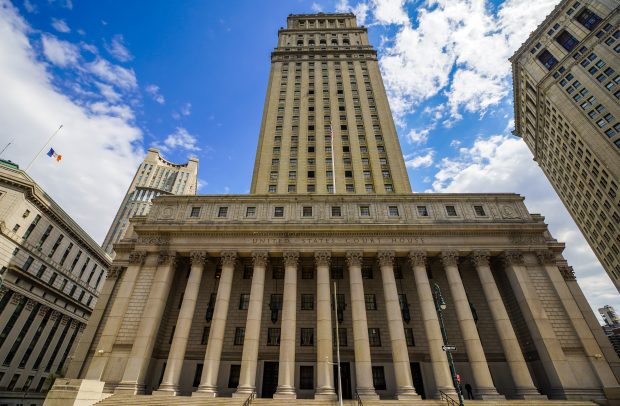 United States Courthouse for the Southern District of New York. (Source: Shutterstock)
United States Courthouse for the Southern District of New York. (Source: Shutterstock)
Former Municipal Credit Union Board Chair and ex-state judge Sylvia Ash is appealing her obstruction of justice conviction and 15-month federal prison sentence, according to documents filed last week with the U.S. District Court for the Southern District of New York in Manhattan.
Ash, 64, was sentenced in April after a jury found her guilty of one felony count of obstruction of justice, one felony count of conspiracy to obstruct justice and one felony count of making false statements to federal officers. She was acquitted on a second felony count of obstruction of justice. Ash also was ordered to pay a $80,000 fine, and serve two years of supervised release, including a special condition of 20 hours of community service per week following her prison term. A decision is pending on whether the $4.3 billion MCU in New York is entitled to restitution for costs it incurred because of Ash's crimes.
 Sylvia Ash
Sylvia Ash Recommended For You
Court testimony and evidence proved that Ash deleted and hid evidence from a federal grand jury and repeatedly lied to federal agents to protect herself and the former CEO, who was at the center of a multimillion-dollar fraud and corruption investigation.
Kam Wong, MCU's former president/CEO, had become the focus of a federal probe in 2018 for embezzlement. He pleaded guilty to stealing nearly $10 million and was sentenced to five and a half years in prison in 2019. Prosecutors also convicted former supervisory committee chair and head of MCU's Fraud and Security Department Joseph Guagliardo, a retired New York City cop. What's more, an investigation revealed allegations of rampant fraud and corruption that not only involved Wong, Guagliardo and Ash, but at least five top executives, another supervisory committee member and 13 former board members, which led to more than $18 million in financial losses and $109 million in write-down losses, according to civil lawsuit court documents.
Ash's lawyer, Justine Harris of New York, filed a notice of appeal on May 10 with the U.S. Court of Appeals for the Second Circuit in Manhattan. Ash is scheduled to begin her prison sentence on July 20, court documents showed, though a federal judge has not yet ruled on whether she will be allowed to remain free on bond while her case is pending before the appeals court.
This is the second appeal filed in a credit union criminal case over the last seven months.
Last October, a federal judge allowed former Melrose Credit Union CEO Alan Kaufman to remain free on bail while he appeals his conviction on bribery and his prison sentence.
Kaufman was sentenced to three years and eight months in prison on Sept. 29 after a jury found him guilty on two felony counts of bribery. His appeal also is pending before the U.S. Court of Appeals for the Second Circuit in Manhattan.
Kaufman was scheduled to report to prison on Nov. 30.
The bribery scheme began in 2010 after Kaufman finalized his divorce and was looking for a new home. Tony Georgiton, a Melrose member who owned a taxi medallion brokerage company and other businesses offered to buy the former CEO a $630,000 luxury home in a gated community in Jericho, N.Y. Though Kaufman paid expenses such as condominium association fees and taxes, Georgiton allowed Kaufman to live in the Jericho home rent-free for more than two years.
While Kaufman lived in the home, he personally approved for Georgiton's companies more than $182 million in loans from the credit union with favorable 50-year amortization periods. The loans also provided total cash outs of $9.8 million, according to court documents. The Georgiton loans violated Melrose's loan policies and were against the advice of the credit union's chief loan officer and directives from the NCUA.
The $1.1 billion Melrose, founded by Kaufman's family, was liquidated in September 2018 after posting more than $745 million in taxi medallion loan losses. Many drivers who took out Melrose loans could not repay them as the value of their taxi medallions plunged because of competition from ride-sharing companies.
Kaufman and Ash are unlikely to win their appeals.
Only 6.6% of the 7,073 criminal federal cases were reversed by the U.S. Court of Appeals across the nation from July 2017 to June 2018, according to an analysis published in a 2019 Emory (University) Law Journal article by Barry C. Edwards, a lecturer at the University of Central Florida's Department of Political Science.
© 2025 ALM Global, LLC, All Rights Reserved. Request academic re-use from www.copyright.com. All other uses, submit a request to [email protected]. For more information visit Asset & Logo Licensing.






